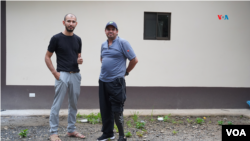FILE – Nicaraguan sculptor Yeison Silva carving a prosthesis in Costa Rica
PhotoVOA
A young Nicaraguan who migrated to Costa Rica since he was little, provides prostheses for low-income people. In some cases it says that they hold raffles or raffles to collect what is necessary for the supplies required for the prosthesis.
For the Nicaraguan sculptor Yeison Silva Fonseca, dedicating himself to manufacturing prostheses in Costa Rica was not in the plans. The new job came unexpectedly for the migrant. A friend’s car accident motivated him to work empirically on what was his first piece.
“A friend lost his leg and had no resources and he told me: Yeison, you make good sculptures, why don’t you make me a prosthesis?” After thinking about it for a while, the young man originally from Nicaragua decided to work on the prosthesis despite having no experience.
“I told myself: everyone admires a sculpture, but a prosthesis will make an obvious change to the person. Imagine a person not walking for a year because they do not have a prosthesis,” said Silva Fonseca, 30, to the Voice of America.
After working on his first prosthetic piece, Silva mentions that many people were surprised by the quality of the work, until it finally became one of his main jobs. “A lot of people said, ‘Wow, who made you that prosthetic?'”
“It was a prosthesis that did not have an exposed tube. They are prostheses according to the person’s silhouette. Height, weight, shape, everything. Try to make the person feel safe with what they have,” recalls Silva.
Silva Fonseca moved to Costa Rica’s Liberia, a province bordering Nicaragua, in 2000 with his mother and siblings for family reasons.
He adds that since he was little he was attracted to paintings and art. “When I was little I liked to watch channels where they broadcast some type of art, then at school, with the competitions, I perfected myself with the subject in art.”
As time went by, Silva began to feel attracted to painting pictures and later that represented economic income for him. On one occasion, already living in Costa Rica, he remembers that a classmate suggested he go sell some paintings he had painted. That day he was surprised because he sold all his works and they paid him more than he asked for.
“A friend from class told me to go sell to a condominium and they bought everything from us. Apart from doing something that I like, it makes me money, so I said here I go.”
During the pandemic, Silva mentions that his income decreased due to the drop in tourism and he began working in some parks on remodeling work. Over time his work was recognized.
More than a job, prostheses are a social contribution
Silva mentions that his friend’s incident marked him so much that he later felt great motivation to do this type of work, and even more so for people with limited resources.
“The majority of people who contact me do not have resources, the majority of people who require a prosthesis must be insured in Costa Rica, so we have held raffles to help people. We see so much need for a prosthesis and the State does not care. can give it. Imagine,” he says.
Joel Zúñiga, a 44-year-old Costa Rican, sought out Silva after losing his leg in a motorcycle accident. Doctors tried during multiple operations to keep him from losing his leg, but it was impossible, he remembers.
He states that something key to overcoming the trauma of the accident was the prosthesis manufactured by Silva Fonseca.
“There are people who stare at my leg and tell me: I congratulate you, I had not seen something so original, that’s the idea.”
According to Silva Fonseca, prostheses require periodic review. He says that he assists or checks people who look for him for free. “It doesn’t matter if I’m busy. I do it,” he says.
Connect with the Voice of America! Subscribe to our channels YouTube, WhatsApp and to newsletter. Turn on notifications and follow us on Facebook, x and instagram.
















Add Comment